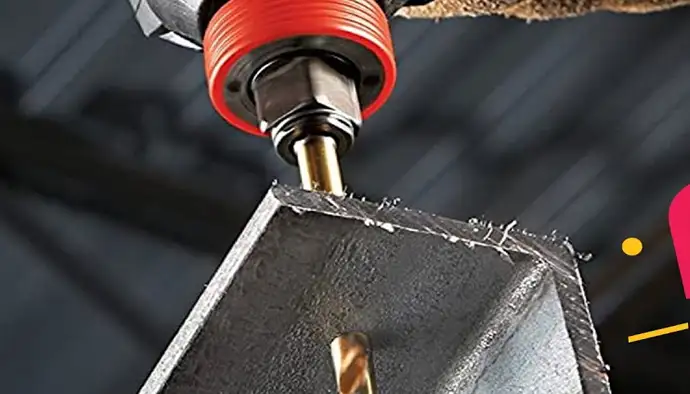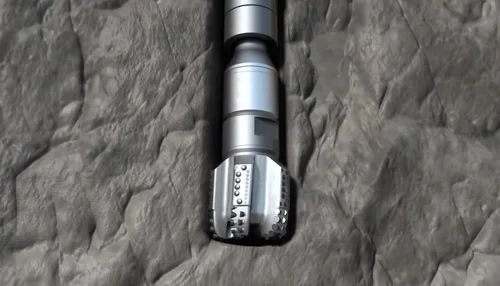Last Updated on July 8, 2022
Can you use drill bits on aluminum? The answer depends on what you’re drilling into. Aluminum is a light, pliable material that is recyclable in most states. But drill bits are not designed to penetrate aluminum, so they tend to become dull and can even eat through the material.
Using the right bit is essential for drilling holes on aluminum. Here are some tips. Read on to find out what kind of bit you need.
Cobalt alloys
When it comes to drilling steel, you don’t want to use drill bits made from cobalt alloys. These tools have high strength and are made to withstand high temperatures.
Drill bits made from cobalt can withstand temperatures of up to 1,100 degrees Fahrenheit, or 593 degrees Celsius. Cobalt drill bits are also 30% faster than those made from other high-strength alloys.
The main benefit of using cobalt drill bits is their incredible strength. They can withstand much higher temperatures than HSS drill bits, and they can be used for longer periods of time without cooling or cutting fluid.
Because they are so resistant to high temperatures, they are best used for cutting hard materials like stainless steel and titanium. This material is not a good choice for wood drilling, but if you’re drilling a masonry wall, cobalt drill bits may be a good choice.
Drill bits on cobalt alloys can provide up to 4 times the life of black oxide drills. The split point tip starts on contact with the material to eliminate bit walking and increases control.
Heavy-duty Cobalt Alloy Steel delivers four times the life of black oxide bits. The split point tip provides increased productivity, even for the toughest jobs. The pilot point (r) and split tip design minimizes angular stress on the bit.
Cobalt drill bits have higher hardness levels than other types of drill bits, but will eventually need sharpening. The best way to maintain cobalt drill bits is by sharpening them regularly.
If the drill bit becomes dull or chips, you can use a bench grinder to hone it. Cobalt drill bits on cobalt alloys are typically the hardest drill bits on the market.
TiN (titanium nitride)
Titanium nitride coated drill bits provide enhanced abrasion resistance and high heat resistance. They require positive feed drilling equipment and last six times longer than standard high speed steel bits.
Unlike standard high speed steel drill bits, they also have a high hot hardness of 135 degrees, which reduces bit walk. The titanium nitride coating also enhances the drill bit’s lubricity.
Titanium nitride coated drill bits are ideal for drilling stainless steel and hard metals. They feature a superhard titanium nitride surface treatment for improved chip ejection and drill life.
Designed for drilling stainless steel and hard metals, Bisco Tin Coated Drills are available in Jobber Length and Fractional and Wire Gauge sizes.
For drilling metals and softer metals, black oxide bits are a good choice. Their black oxide finish reduces friction between the bit and workpiece, increasing drilling speed and life by up to 50%.
The Nitanium Nitride coating prevents rusting and extends drill bit life. Its superior heat resistance and high feed rate make it a great choice for professionals.
Titanium nitride-coated drill bits are faster and more durable than standard high-speed steel ones. In addition to the higher hardness, titanium nitride-coated drill bits also reduce friction and increase tool life.
As a result, they last six times longer than standard high-speed steel bits. The benefits of these drill bits are endless! And what is great about them is that they can be used on a variety of materials, including stainless steel, cast iron, and aluminum.
High-speed steel and titanium drill bits are hardener than cobalt bits. They are used for drilling mild steel, cast iron, copper, brass, and aluminum alloys.
They are not appropriate for concrete drilling. You should instead use masonry bits with carbide tips for these types of materials. If you are unsure of which type to use, consult with a professional for more information.
Wood drill bits
While drilling aluminum, it is recommended to use drill bits made from metal, such as cobalt or black oxide. These drill bits have a lower melting point than aluminum, making them ideal for long-distance drilling.
The speed of drilling aluminum should be between 200 and 300 rpm. If you plan to use drill bits for long distance drilling, you should avoid using round-shaped drill bits, as these are not ideal for making holes in metal.
Titanium-coated wood drill bits are durable and last for a long time. This coating prevents bit walking, giving you a smooth hole every time.
These bits have a staggered cutting edge that prevents chatter while drilling. Split-point tip and twist designs increase drilling speed and prevent walking.
Their two-sided shape also reduces heat transmission and friction, allowing for faster drilling. You can also easily store and carry these bits with you to work on different projects.
Other types of drill bits are available. If you are using a drill for hard metal, choose a cobalt bit. Cobalt drill bits have a hardened core and are more resistant to abrasion than other types of metal bits.
However, they are expensive. Carbide drill bits are great for drilling thick metal and hardwood, but they will chip if you don’t handle them carefully. Copper-cobalt drill bits are a good choice for drilling aluminum, too, but they’re not as durable.
Another option is to purchase a kit that has drill bits in different sizes and types. One type includes an aluminum organizing holder, which will save you time and keep your bits organized.
The aluminum case is also useful for transporting and storing your bits. Some drill bits come with a 2 year warranty. While a wood drill bit won’t make a deep hole, it is perfect for drilling through metal. And a hex drill bit can also be used for drilling aluminum, too.
PDC bits
The new Weatherford DwC bit offers the advantages of both aluminum noses and blade supports with the durability of a full PDC cutting structure. The bit is compatible with all conventional PDC drill bits.
Another unique feature of the Weatherford DwC bit is the lack of moving parts in the bit. There are no ball drops or other metal components to cause problems during drilling. Furthermore, this bit has been successfully drilled in a variety of formations with various compressive strengths.
Heavy Oil Gauge PDC bits are made in Canada and designed to drill long holes. They feature excellent steerability and repeatability. They also feature robust backreaming features and an abrasion-resistant gauge pad.
The High ROP of these bits indicates that the cutting structure of the bit remained sharp even after drilling out a 20-inch shoe track. The resulting hole diameter is the same as the original one, thus reducing drilling costs.
The latest development in the evolution of the PDC bits is the conical diamond cutter. It features double the thickness of traditional PDC bits and has proven to be more resistant to wear and abrasion.
The conical diamond element can be placed at the center of the conventional PDC bit and crushes the rock for improved rates of penetration. Its multiple CDEs increase footage and toolface control.
And as a bonus, it is easier to clean and maintain the bit face, so you can use this versatile bit on aluminum and other materials.
Polycrystalline Diamond Compact Bits: These bits are much stronger than their HSS counterparts. They are also less sensitive to force applications, and can reach higher rotational speeds without wear and tear.
This makes them useful for long-term drilling campaigns and processes that demand extreme precision. When choosing a drill bit, take into consideration the hardness of the metal and its weight. The heavier the metal, the more inertia it has, making it much easier to drill into a material.
Carbide tip bits
While there is plenty of information available online about the use of carbide tip drill bits on aluminum, there are a few factors you should be aware of when using them.
Aluminum is an extremely soft metal with a melting point of 660 degrees Celsius compared to the 1510 degree C of stainless steel. That means that it is very important to use the correct drill bit to avoid causing the aluminum to stick to the bit as it heats up.
Carbide tip drill bits are made for industrial applications. They are designed for automated processes and are not suitable for manual procedures. For example, aerospace and automotive factories require drill bits with the hardest tips.
However, they are not the only ones that can withstand such abrasion. Because of their carbide tip, they are more stable, resulting in less bending and flexing of the material. Carbide bit tips are often coated with a black oxide coating to retain lubricants.
Titanium nitrate coatings enable extended wear on metals like titanium. Titanium aluminum nitrate coatings are more durable and resist heat and abrasion at high speeds. Finally, silicon multilayer coatings are used for aluminum.
While using carbide tip drill bits on aluminum is not recommended for heavy drilling, the coating provides excellent protection from friction and corrosion.
This coating also reduces the amount of heat generated while drilling metals. However, carbide bit coating is only applied on the cutting edges and must be replaced once the coating wears off. Carbide tip drill bits can be very dangerous for aluminum as they will break easily if you are not careful when using them.
Frequently Asked Questions (FAQs)
– What type of drill bit should be used on aluminum?
Ideally, a drill bit made specifically for drilling aluminum should be used when working with this material. However, if a bit designed for another type of metal is the only option available, it is possible to use this on aluminum as well.
In general, a higher number size for the bit indicates that it is better suited for drilling into harder materials. Therefore, a smaller number bit would be better for aluminum. It is also important to choose a drill bit with a sharp point.
– What is the best way to drill into aluminum?
When drilling into aluminum, it is important to use a low speed and apply consistent pressure. Drilling too quickly or with too much pressure can cause the bit to break or damage the aluminum.
– Can a normal drill bit be used to drill into aluminum?
Yes, a normal drill bit can be used to drill into aluminum if it is sharp and the correct size for the material. It is important to use a low speed and apply pressure evenly when drilling into aluminum to avoid damaging the material.
– Why are drill bits ineffective when drilling into aluminum?
The drill bits are ineffective when drilling into aluminum because they are not designed to penetrate this material. The drill bit becomes dull and can even eat through the aluminum when used. It is important to use a drill bit that is specifically designed for drilling into aluminum.
– How can you ensure that your drill bits remain sharp when drilling through aluminum?
One way to keep your drill bits sharp when drilling through aluminum is to use a lubricant. Applying a lubricant while drilling will help the bit move more smoothly through the metal and will keep it from becoming dull. Another option is to use a pilot hole.
Drilling a small hole first before starting to drill into the larger piece of aluminum will help the bit stay sharp and prevent it from becoming damaged.
Final Words
You can use drill bits on aluminum, but only if you’re using the correct type of bit. With the proper precautions, you can avoid damaging your material and your drill bit. Thanks for reading!



